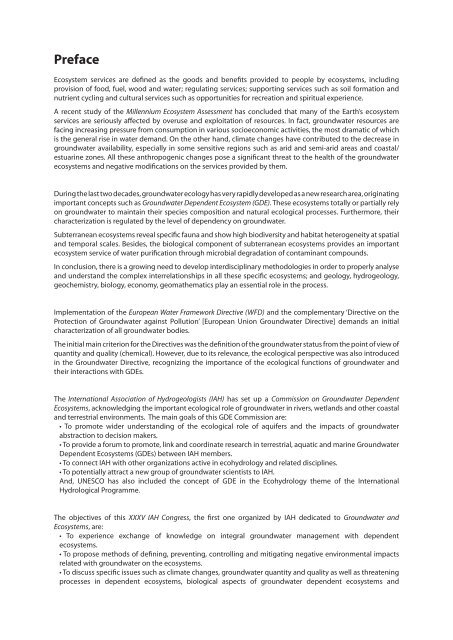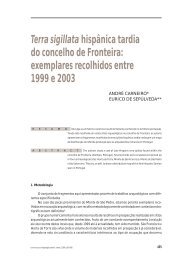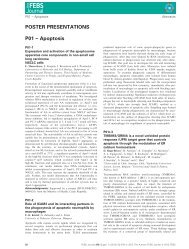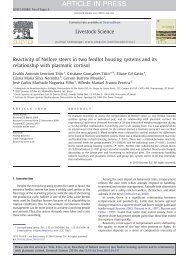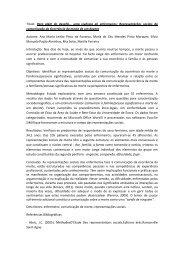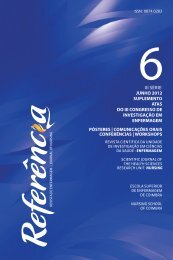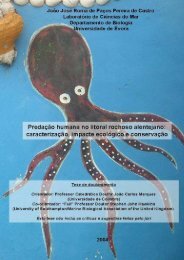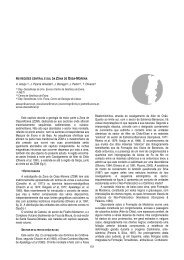- Page 2 and 3: Legal Notice Neither the Publisher
- Page 5: SCIENTIFIC COMMITTEE Luís Ribeiro
- Page 9 and 10: Table of Contents Keynotes EXPANDIN
- Page 11 and 12: NEAR SURFACE HYDRAULIC AND GEOPHYSI
- Page 13 and 14: HYDRAULIC INTERACTIONS BETWEEN RIVE
- Page 15 and 16: ESTIMATING BACKGROUND VALUES IN SHA
- Page 17 and 18: HYDROGEOLOGICAL AND GEOELECTRICAL P
- Page 19 and 20: THE INFLUENCE OF GEOLOGIC STRUCTURE
- Page 21 and 22: NITROGEN CYCLE IN GRAVEL BED RIVERS
- Page 23 and 24: SPATIAL DISTRIBUTION OF BENZENE AND
- Page 25 and 26: SPECTRAL AND WAVELET ANALYSES OF HY
- Page 27 and 28: TOPIC 11 Impact of climate and glob
- Page 29 and 30: AGUAS DO OESTE, S.A. GROUNDWATER SO
- Page 31 and 32: ___________________________________
- Page 33 and 34: IS TRITIUM A USEFUL TOOL TO STUDY T
- Page 35 and 36: ASSESSMENT OF GROUNDWATER CONTAMINA
- Page 37: MULTI-TRACER TESTS TO ASSESS THE IM
- Page 41 and 42: IAH 2007 XXXV Congress - Groundwate
- Page 43 and 44: IAH 2007 XXXV Congress - Groundwate
- Page 45 and 46: IAH 2007 XXXV Congress - Groundwate
- Page 47 and 48: IAH 2007 XXXV Congress - Groundwate
- Page 49 and 50: IAH 2007 XXXV Congress - Groundwate
- Page 51 and 52: IAH 2007 XXXV Congress - Groundwate
- Page 53 and 54: IAH 2007 XXXV Congress - Groundwate
- Page 55: TOPIC 01 Groundwater/surface-water
- Page 58 and 59:
IAH 2007 XXXV Congress - Groundwate
- Page 60 and 61:
IAH 2007 XXXV Congress - Groundwate
- Page 62 and 63:
IAH 2007 XXXV Congress - Groundwate
- Page 64 and 65:
IAH 2007 XXXV Congress - Groundwate
- Page 66 and 67:
IAH 2007 XXXV Congress - Groundwate
- Page 68 and 69:
IAH 2007 XXXV Congress - Groundwate
- Page 70 and 71:
IAH 2007 XXXV Congress - Groundwate
- Page 72 and 73:
IAH 2007 XXXV Congress - Groundwate
- Page 74 and 75:
IAH 2007 XXXV Congress - Groundwate
- Page 76 and 77:
IAH 2007 XXXV Congress - Groundwate
- Page 78 and 79:
IAH 2007 XXXV Congress - Groundwate
- Page 80 and 81:
IAH 2007 XXXV Congress - Groundwate
- Page 82 and 83:
IAH 2007 XXXV Congress - Groundwate
- Page 84 and 85:
IAH 2007 XXXV Congress - Groundwate
- Page 86 and 87:
IAH 2007 XXXV Congress - Groundwate
- Page 88 and 89:
IAH 2007 XXXV Congress - Groundwate
- Page 90 and 91:
IAH 2007 XXXV Congress - Groundwate
- Page 92 and 93:
IAH 2007 XXXV Congress - Groundwate
- Page 94 and 95:
IAH 2007 XXXV Congress - Groundwate
- Page 96 and 97:
IAH 2007 XXXV Congress - Groundwate
- Page 98 and 99:
IAH 2007 XXXV Congress - Groundwate
- Page 100 and 101:
IAH 2007 XXXV Congress - Groundwate
- Page 102 and 103:
IAH 2007 XXXV Congress - Groundwate
- Page 104 and 105:
IAH 2007 XXXV Congress - Groundwate
- Page 106 and 107:
IAH 2007 XXXV Congress - Groundwate
- Page 109 and 110:
IAH 2007 XXXV Congress - Groundwate
- Page 111 and 112:
IAH 2007 XXXV Congress - Groundwate
- Page 113 and 114:
IAH 2007 XXXV Congress - Groundwate
- Page 115 and 116:
IAH 2007 XXXV Congress - Groundwate
- Page 117 and 118:
IAH 2007 XXXV Congress - Groundwate
- Page 119 and 120:
IAH 2007 XXXV Congress - Groundwate
- Page 121 and 122:
IAH 2007 XXXV Congress - Groundwate
- Page 123 and 124:
IAH 2007 XXXV Congress - Groundwate
- Page 125 and 126:
IAH 2007 XXXV Congress - Groundwate
- Page 127 and 128:
IAH 2007 XXXV Congress - Groundwate
- Page 129 and 130:
IAH 2007 XXXV Congress - Groundwate
- Page 131 and 132:
IAH 2007 XXXV Congress - Groundwate
- Page 133 and 134:
IAH 2007 XXXV Congress - Groundwate
- Page 135 and 136:
IAH 2007 XXXV Congress - Groundwate
- Page 137 and 138:
IAH 2007 XXXV Congress - Groundwate
- Page 139 and 140:
IAH 2007 XXXV Congress - Groundwate
- Page 141 and 142:
IAH 2007 XXXV Congress - Groundwate
- Page 143 and 144:
IAH 2007 XXXV Congress - Groundwate
- Page 145 and 146:
IAH 2007 XXXV Congress - Groundwate
- Page 147 and 148:
IAH 2007 XXXV Congress - Groundwate
- Page 149 and 150:
IAH 2007 XXXV Congress - Groundwate
- Page 151 and 152:
IAH 2007 XXXV Congress - Groundwate
- Page 153 and 154:
IAH 2007 XXXV Congress - Groundwate
- Page 155 and 156:
IAH 2007 XXXV Congress - Groundwate
- Page 157 and 158:
IAH 2007 XXXV Congress - Groundwate
- Page 159 and 160:
IAH 2007 XXXV Congress - Groundwate
- Page 161 and 162:
IAH 2007 XXXV Congress - Groundwate
- Page 163:
TOPIC 02 Groundwater quantity, base
- Page 166 and 167:
IAH 2007 XXXV Congress - Groundwate
- Page 168 and 169:
IAH 2007 XXXV Congress - Groundwate
- Page 170 and 171:
IAH 2007 XXXV Congress - Groundwate
- Page 172 and 173:
IAH 2007 XXXV Congress - Groundwate
- Page 174 and 175:
IAH 2007 XXXV Congress - Groundwate
- Page 176 and 177:
IAH 2007 XXXV Congress - Groundwate
- Page 178 and 179:
IAH 2007 XXXV Congress - Groundwate
- Page 180 and 181:
IAH 2007 XXXV Congress - Groundwate
- Page 182 and 183:
IAH 2007 XXXV Congress - Groundwate
- Page 184 and 185:
IAH 2007 XXXV Congress - Groundwate
- Page 186 and 187:
IAH 2007 XXXV Congress - Groundwate
- Page 188 and 189:
IAH 2007 XXXV Congress - Groundwate
- Page 190 and 191:
IAH 2007 XXXV Congress - Groundwate
- Page 192 and 193:
IAH 2007 XXXV Congress - Groundwate
- Page 194 and 195:
IAH 2007 XXXV Congress - Groundwate
- Page 196 and 197:
IAH 2007 XXXV Congress - Groundwate
- Page 198 and 199:
IAH 2007 XXXV Congress - Groundwate
- Page 200 and 201:
IAH 2007 XXXV Congress - Groundwate
- Page 202 and 203:
IAH 2007 XXXV Congress - Groundwate
- Page 204 and 205:
IAH 2007 XXXV Congress - Groundwate
- Page 207 and 208:
IAH 2007 XXXV Congress - Groundwate
- Page 209 and 210:
IAH 2007 XXXV Congress - Groundwate
- Page 211 and 212:
IAH 2007 XXXV Congress - Groundwate
- Page 213 and 214:
IAH 2007 XXXV Congress - Groundwate
- Page 215 and 216:
IAH 2007 XXXV Congress - Groundwate
- Page 217 and 218:
IAH 2007 XXXV Congress - Groundwate
- Page 219 and 220:
IAH 2007 XXXV Congress - Groundwate
- Page 221 and 222:
IAH 2007 XXXV Congress - Groundwate
- Page 223 and 224:
IAH 2007 XXXV Congress - Groundwate
- Page 225 and 226:
IAH 2007 XXXV Congress - Groundwate
- Page 227 and 228:
IAH 2007 XXXV Congress - Groundwate
- Page 229 and 230:
IAH 2007 XXXV Congress - Groundwate
- Page 231 and 232:
IAH 2007 XXXV Congress - Groundwate
- Page 233 and 234:
IAH 2007 XXXV Congress - Groundwate
- Page 235 and 236:
IAH 2007 XXXV Congress - Groundwate
- Page 237 and 238:
IAH 2007 XXXV Congress - Groundwate
- Page 239:
TOPIC 03 Estimating and determining
- Page 242 and 243:
IAH 2007 XXXV Congress - Groundwate
- Page 244 and 245:
IAH 2007 XXXV Congress - Groundwate
- Page 246 and 247:
IAH 2007 XXXV Congress - Groundwate
- Page 248 and 249:
IAH 2007 XXXV Congress - Groundwate
- Page 250 and 251:
IAH 2007 XXXV Congress - Groundwate
- Page 252 and 253:
IAH 2007 XXXV Congress - Groundwate
- Page 254 and 255:
IAH 2007 XXXV Congress - Groundwate
- Page 256 and 257:
IAH 2007 XXXV Congress - Groundwate
- Page 258 and 259:
IAH 2007 XXXV Congress - Groundwate
- Page 260 and 261:
IAH 2007 XXXV Congress - Groundwate
- Page 262 and 263:
IAH 2007 XXXV Congress - Groundwate
- Page 264 and 265:
IAH 2007 XXXV Congress - Groundwate
- Page 266 and 267:
IAH 2007 XXXV Congress - Groundwate
- Page 268 and 269:
IAH 2007 XXXV Congress - Groundwate
- Page 271 and 272:
IAH 2007 XXXV Congress - Groundwate
- Page 273 and 274:
IAH 2007 XXXV Congress - Groundwate
- Page 275 and 276:
IAH 2007 XXXV Congress - Groundwate
- Page 277 and 278:
IAH 2007 XXXV Congress - Groundwate
- Page 279 and 280:
IAH 2007 XXXV Congress - Groundwate
- Page 281 and 282:
IAH 2007 XXXV Congress - Groundwate
- Page 283 and 284:
IAH 2007 XXXV Congress - Groundwate
- Page 285 and 286:
IAH 2007 XXXV Congress - Groundwate
- Page 287:
TOPIC 04 Impact of groundwater cont
- Page 290 and 291:
IAH 2007 XXXV Congress - Groundwate
- Page 292 and 293:
IAH 2007 XXXV Congress - Groundwate
- Page 294 and 295:
IAH 2007 XXXV Congress - Groundwate
- Page 296 and 297:
IAH 2007 XXXV Congress - Groundwate
- Page 298 and 299:
IAH 2007 XXXV Congress - Groundwate
- Page 300 and 301:
IAH 2007 XXXV Congress - Groundwate
- Page 302 and 303:
IAH 2007 XXXV Congress - Groundwate
- Page 304 and 305:
IAH 2007 XXXV Congress - Groundwate
- Page 306 and 307:
IAH 2007 XXXV Congress - Groundwate
- Page 308 and 309:
IAH 2007 XXXV Congress - Groundwate
- Page 310 and 311:
IAH 2007 XXXV Congress - Groundwate
- Page 313 and 314:
IAH 2007 XXXV Congress - Groundwate
- Page 315 and 316:
IAH 2007 XXXV Congress - Groundwate
- Page 317 and 318:
IAH 2007 XXXV Congress - Groundwate
- Page 319 and 320:
IAH 2007 XXXV Congress - Groundwate
- Page 321 and 322:
IAH 2007 XXXV Congress - Groundwate
- Page 323 and 324:
IAH 2007 XXXV Congress - Groundwate
- Page 325 and 326:
IAH 2007 XXXV Congress - Groundwate
- Page 327 and 328:
IAH 2007 XXXV Congress - Groundwate
- Page 329:
TOPIC 05 Biological assessment of g
- Page 332 and 333:
IAH 2007 XXXV Congress - Groundwate
- Page 334 and 335:
IAH 2007 XXXV Congress - Groundwate
- Page 337 and 338:
IAH 2007 XXXV Congress - Groundwate
- Page 339 and 340:
IAH 2007 XXXV Congress - Groundwate
- Page 341 and 342:
IAH 2007 XXXV Congress - Groundwate
- Page 343:
TOPIC 07 Biodegradation processes i
- Page 346 and 347:
IAH 2007 XXXV Congress - Groundwate
- Page 348 and 349:
IAH 2007 XXXV Congress - Groundwate
- Page 350 and 351:
IAH 2007 XXXV Congress - Groundwate
- Page 352 and 353:
IAH 2007 XXXV Congress - Groundwate
- Page 354 and 355:
IAH 2007 XXXV Congress - Groundwate
- Page 356 and 357:
IAH 2007 XXXV Congress - Groundwate
- Page 359 and 360:
IAH 2007 XXXV Congress - Groundwate
- Page 361 and 362:
IAH 2007 XXXV Congress - Groundwate
- Page 363 and 364:
IAH 2007 XXXV Congress - Groundwate
- Page 365 and 366:
IAH 2007 XXXV Congress - Groundwate
- Page 367:
TOPIC 08 Different approaches towar
- Page 370 and 371:
IAH 2007 XXXV Congress - Groundwate
- Page 372 and 373:
IAH 2007 XXXV Congress - Groundwate
- Page 375 and 376:
IAH 2007 XXXV Congress - Groundwate
- Page 377 and 378:
IAH 2007 XXXV Congress - Groundwate
- Page 379 and 380:
IAH 2007 XXXV Congress - Groundwate
- Page 381 and 382:
IAH 2007 XXXV Congress - Groundwate
- Page 383 and 384:
IAH 2007 XXXV Congress - Groundwate
- Page 385:
TOPIC 09 Karstic ecosystems: biolog
- Page 388 and 389:
IAH 2007 XXXV Congress - Groundwate
- Page 390 and 391:
IAH 2007 XXXV Congress - Groundwate
- Page 392 and 393:
IAH 2007 XXXV Congress - Groundwate
- Page 394 and 395:
IAH 2007 XXXV Congress - Groundwate
- Page 396 and 397:
IAH 2007 XXXV Congress - Groundwate
- Page 398 and 399:
IAH 2007 XXXV Congress - Groundwate
- Page 400 and 401:
IAH 2007 XXXV Congress - Groundwate
- Page 402 and 403:
IAH 2007 XXXV Congress - Groundwate
- Page 404 and 405:
IAH 2007 XXXV Congress - Groundwate
- Page 406 and 407:
IAH 2007 XXXV Congress - Groundwate
- Page 408 and 409:
IAH 2007 XXXV Congress - Groundwate
- Page 410 and 411:
IAH 2007 XXXV Congress - Groundwate
- Page 413 and 414:
IAH 2007 XXXV Congress - Groundwate
- Page 415 and 416:
IAH 2007 XXXV Congress - Groundwate
- Page 417 and 418:
IAH 2007 XXXV Congress - Groundwate
- Page 419 and 420:
IAH 2007 XXXV Congress - Groundwate
- Page 421 and 422:
IAH 2007 XXXV Congress - Groundwate
- Page 423 and 424:
IAH 2007 XXXV Congress - Groundwate
- Page 425 and 426:
IAH 2007 XXXV Congress - Groundwate
- Page 427 and 428:
IAH 2007 XXXV Congress - Groundwate
- Page 429 and 430:
IAH 2007 XXXV Congress - Groundwate
- Page 431:
TOPIC 10 Groundwater impact on coas
- Page 434 and 435:
IAH 2007 XXXV Congress - Groundwate
- Page 436 and 437:
IAH 2007 XXXV Congress - Groundwate
- Page 438 and 439:
IAH 2007 XXXV Congress - Groundwate
- Page 440 and 441:
IAH 2007 XXXV Congress - Groundwate
- Page 442 and 443:
IAH 2007 XXXV Congress - Groundwate
- Page 444 and 445:
IAH 2007 XXXV Congress - Groundwate
- Page 447 and 448:
IAH 2007 XXXV Congress - Groundwate
- Page 449 and 450:
IAH 2007 XXXV Congress - Groundwate
- Page 451 and 452:
IAH 2007 XXXV Congress - Groundwate
- Page 453 and 454:
IAH 2007 XXXV Congress - Groundwate
- Page 455 and 456:
IAH 2007 XXXV Congress - Groundwate
- Page 457 and 458:
IAH 2007 XXXV Congress - Groundwate
- Page 459:
TOPIC 11 Impact of climate and glob
- Page 462 and 463:
IAH 2007 XXXV Congress - Groundwate
- Page 464 and 465:
IAH 2007 XXXV Congress - Groundwate
- Page 466 and 467:
IAH 2007 XXXV Congress - Groundwate
- Page 468 and 469:
IAH 2007 XXXV Congress - Groundwate
- Page 470 and 471:
IAH 2007 XXXV Congress - Groundwate
- Page 473 and 474:
IAH 2007 XXXV Congress - Groundwate
- Page 475 and 476:
IAH 2007 XXXV Congress - Groundwate
- Page 477 and 478:
IAH 2007 XXXV Congress - Groundwate
- Page 479:
TOPIC 12 EU Water Framework Directi
- Page 482 and 483:
IAH 2007 XXXV Congress - Groundwate
- Page 484 and 485:
IAH 2007 XXXV Congress - Groundwate
- Page 486 and 487:
IAH 2007 XXXV Congress - Groundwate
- Page 488 and 489:
IAH 2007 XXXV Congress - Groundwate
- Page 490 and 491:
IAH 2007 XXXV Congress - Groundwate
- Page 492 and 493:
IAH 2007 XXXV Congress - Groundwate
- Page 494 and 495:
IAH 2007 XXXV Congress - Groundwate
- Page 496 and 497:
IAH 2007 XXXV Congress - Groundwate
- Page 498 and 499:
IAH 2007 XXXV Congress - Groundwate
- Page 501 and 502:
IAH 2007 XXXV Congress - Groundwate
- Page 503 and 504:
IAH 2007 XXXV Congress - Groundwate
- Page 505 and 506:
IAH 2007 XXXV Congress - Groundwate
- Page 507 and 508:
IAH 2007 XXXV Congress - Groundwate
- Page 509:
TOPIC 13 Groundwater modelling: det
- Page 512 and 513:
IAH 2007 XXXV Congress - Groundwate
- Page 514 and 515:
IAH 2007 XXXV Congress - Groundwate
- Page 516 and 517:
IAH 2007 XXXV Congress - Groundwate
- Page 518 and 519:
IAH 2007 XXXV Congress - Groundwate
- Page 520 and 521:
IAH 2007 XXXV Congress - Groundwate
- Page 522 and 523:
IAH 2007 XXXV Congress - Groundwate
- Page 524 and 525:
IAH 2007 XXXV Congress - Groundwate
- Page 526 and 527:
IAH 2007 XXXV Congress - Groundwate
- Page 528 and 529:
IAH 2007 XXXV Congress - Groundwate
- Page 530 and 531:
IAH 2007 XXXV Congress - Groundwate
- Page 532 and 533:
IAH 2007 XXXV Congress - Groundwate
- Page 534 and 535:
IAH 2007 XXXV Congress - Groundwate
- Page 536 and 537:
IAH 2007 XXXV Congress - Groundwate
- Page 538 and 539:
IAH 2007 XXXV Congress - Groundwate
- Page 540 and 541:
IAH 2007 XXXV Congress - Groundwate
- Page 542 and 543:
IAH 2007 XXXV Congress - Groundwate
- Page 544 and 545:
IAH 2007 XXXV Congress - Groundwate
- Page 547 and 548:
IAH 2007 XXXV Congress - Groundwate
- Page 549 and 550:
IAH 2007 XXXV Congress - Groundwate
- Page 551 and 552:
IAH 2007 XXXV Congress - Groundwate
- Page 553 and 554:
IAH 2007 XXXV Congress - Groundwate
- Page 555 and 556:
IAH 2007 XXXV Congress - Groundwate
- Page 557 and 558:
IAH 2007 XXXV Congress - Groundwate
- Page 559 and 560:
IAH 2007 XXXV Congress - Groundwate
- Page 561 and 562:
IAH 2007 XXXV Congress - Groundwate
- Page 563 and 564:
IAH 2007 XXXV Congress - Groundwate
- Page 565 and 566:
IAH 2007 XXXV Congress - Groundwate
- Page 567 and 568:
IAH 2007 XXXV Congress - Groundwate
- Page 569 and 570:
IAH 2007 XXXV Congress - Groundwate
- Page 571 and 572:
IAH 2007 XXXV Congress - Groundwate
- Page 573 and 574:
IAH 2007 XXXV Congress - Groundwate
- Page 575 and 576:
IAH 2007 XXXV Congress - Groundwate
- Page 577 and 578:
IAH 2007 XXXV Congress - Groundwate
- Page 579:
TOPIC 14 Isotopic methods to assess
- Page 582 and 583:
IAH 2007 XXXV Congress - Groundwate
- Page 584 and 585:
IAH 2007 XXXV Congress - Groundwate
- Page 586 and 587:
IAH 2007 XXXV Congress - Groundwate
- Page 588 and 589:
IAH 2007 XXXV Congress - Groundwate
- Page 590 and 591:
IAH 2007 XXXV Congress - Groundwate
- Page 592 and 593:
IAH 2007 XXXV Congress - Groundwate
- Page 594 and 595:
IAH 2007 XXXV Congress - Groundwate
- Page 596 and 597:
IAH 2007 XXXV Congress - Groundwate
- Page 598 and 599:
IAH 2007 XXXV Congress - Groundwate
- Page 600 and 601:
IAH 2007 XXXV Congress - Groundwate
- Page 602 and 603:
IAH 2007 XXXV Congress - Groundwate
- Page 604 and 605:
IAH 2007 XXXV Congress - Groundwate
- Page 606 and 607:
IAH 2007 XXXV Congress - Groundwate
- Page 608 and 609:
IAH 2007 XXXV Congress - Groundwate
- Page 611 and 612:
IAH 2007 XXXV Congress - Groundwate
- Page 613 and 614:
IAH 2007 XXXV Congress - Groundwate
- Page 615 and 616:
IAH 2007 XXXV Congress - Groundwate
- Page 617 and 618:
IAH 2007 XXXV Congress - Groundwate
- Page 619 and 620:
IAH 2007 XXXV Congress - Groundwate
- Page 621:
TOPIC 15 GIS and remote sensing ana
- Page 624 and 625:
IAH 2007 XXXV Congress - Groundwate
- Page 626 and 627:
IAH 2007 XXXV Congress - Groundwate
- Page 628 and 629:
IAH 2007 XXXV Congress - Groundwate
- Page 630 and 631:
IAH 2007 XXXV Congress - Groundwate
- Page 632 and 633:
IAH 2007 XXXV Congress - Groundwate
- Page 635 and 636:
IAH 2007 XXXV Congress - Groundwate
- Page 637 and 638:
IAH 2007 XXXV Congress - Groundwate
- Page 639 and 640:
IAH 2007 XXXV Congress - Groundwate
- Page 641 and 642:
IAH 2007 XXXV Congress - Groundwate
- Page 643 and 644:
IAH 2007 XXXV Congress - Groundwate
- Page 645 and 646:
IAH 2007 XXXV Congress - Groundwate
- Page 647 and 648:
IAH 2007 XXXV Congress - Groundwate
- Page 649 and 650:
IAH 2007 XXXV Congress - Groundwate
- Page 651 and 652:
IAH 2007 XXXV Congress - Groundwate
- Page 653 and 654:
IAH 2007 XXXV Congress - Groundwate
- Page 655 and 656:
IAH 2007 XXXV Congress - Groundwate
- Page 657 and 658:
IAH 2007 XXXV Congress - Groundwate
- Page 659:
TOPIC 16 Valuing groundwater qualit
- Page 662 and 663:
IAH 2007 XXXV Congress - Groundwate
- Page 664 and 665:
IAH 2007 XXXV Congress - Groundwate
- Page 667 and 668:
IAH 2007 XXXV Congress - Groundwate
- Page 669 and 670:
IAH 2007 XXXV Congress - Groundwate
- Page 671:
TOPIC 17 Other major groundwater is
- Page 674 and 675:
IAH 2007 XXXV Congress - Groundwate
- Page 676 and 677:
IAH 2007 XXXV Congress - Groundwate
- Page 678 and 679:
IAH 2007 XXXV Congress - Groundwate
- Page 680 and 681:
IAH 2007 XXXV Congress - Groundwate
- Page 682 and 683:
IAH 2007 XXXV Congress - Groundwate
- Page 685 and 686:
IAH 2007 XXXV Congress - Groundwate
- Page 687 and 688:
IAH 2007 XXXV Congress - Groundwate
- Page 689 and 690:
IAH 2007 XXXV Congress - Groundwate
- Page 691 and 692:
IAH 2007 XXXV Congress - Groundwate
- Page 693 and 694:
IAH 2007 XXXV Congress - Groundwate
- Page 695 and 696:
IAH 2007 XXXV Congress - Groundwate
- Page 697 and 698:
IAH 2007 XXXV Congress - Groundwate
- Page 699:
IAH 2007 XXXV Congress - Groundwate
- Page 702 and 703:
ARLAI, PHATCHARASAK 481 ASSABA, MOH
- Page 704 and 705:
BROWN, LES 208 BUACHIDZE, GURAM 165
- Page 706 and 707:
CZAUNER, BRIGITTA 343 D D'ARCEVIA,
- Page 708 and 709:
FAYE, ABDOULAYE 559 FAYE, SERIGNE 5
- Page 710 and 711:
GÓMEZ, IGNACIO 262 GÓMEZ, MARAGAR
- Page 712 and 713:
KEENE, ANNABELLE F. 411 KEIZER, JAC
- Page 714 and 715:
LIU, LEI 260 LIU, ZAIHUA 349 LJUMOV
- Page 716 and 717:
MEDEIROS, JOSE 177 MEJÍA GONZÁLEZ
- Page 718 and 719:
OGIER, SYLVIE 369 OLIVEIRA E SILVA,
- Page 720 and 721:
PéREZ, ELENA 543, 573 Q QUARRIE, S
- Page 722 and 723:
SAPPA, GIUSEPPE 509, 607 SAVIC, NEV
- Page 724 and 725:
TERZI, JOSIP 355 THERRIEN, RENé 49
- Page 726 and 727:
WERZ, HEIKE 610 WHEATER, HOWARD 57


